2021 FORD MUSTANG engine coolant
[x] Cancel search: engine coolantPage 8 of 530

Customer Assistance
Getting the Services You Need
..............238
In California (U.S. Only) ...........................
239
The Better Business Bureau (BBB) Auto Line Program (U.S. Only) ....................
240
Utilizing the Mediation/Arbitration Program (Canada Only) .......................
241
Getting Assistance Outside the U.S. and Canada ........................................................
241
Ordering Additional Owner's Literature ........................................................................\
243
Reporting Safety Defects (U.S. Only) ........................................................................\
243
Reporting Safety Defects (Canada Only) ........................................................................\
243
Fuses
Fuse Specification Chart .........................
245
Changing a Fuse .........................................
254
Maintenance
General Information ..................................
256
Opening and Closing the Hood .............
256
Under Hood Overview - 2.3L EcoBoost™ ........................................................................\
258
Under Hood Overview - 5.0L .................
259
Under Hood Overview - 5.0L, Mach 1 .......................................................................
260
Engine Oil Dipstick ......................................
261
Engine Oil Check ..........................................
261
Oil Change Indicator Reset ......................
261
Changing the Engine Air Filter - 5.0L, Mach 1 .........................................................
262
Changing the Engine Air Filter - 2.3L EcoBoost™/5.0L ....................................
263
Engine Coolant Check ..............................
264
Manual Transmission Fluid Check - 6-Speed Manual Transmission – 3160
........................................................................\
268
Manual Transmission Fluid Check - 6-Speed Manual Transmission – MT82
........................................................................\
268 Automatic Transmission Fluid Check
........................................................................\
269
Brake Fluid Check .......................................
269
Clutch Fluid Check - Manual Transmission ............................................
270
Power Steering Fluid Check ....................
270
Changing the 12V Battery ........................
270
Adjusting the Headlamps ........................
272
Washer Fluid Check ...................................
274
Fuel Filter ........................................................
274
Checking the Wiper Blades .....................
274
Changing the Wiper Blades ....................
274
Changing a Bulb ..........................................
275
Track Use
Track Use - Mach 1 ......................................
276
Track Use .......................................................
283
Vehicle Care
General Information ..................................
289
General Information - GT500/Mach 1 ........................................................................\
289
Cleaning Products .....................................
290
Cleaning the Exterior - Mach 1 ................
291
Cleaning the Exterior ..................................
291
Waxing ............................................................
293
Cleaning the Engine - Mach 1 .................
293
Cleaning the Engine ...................................
293
Cleaning the Windows and Wiper Blades ........................................................................\
294
Cleaning the Interior ..................................
294
Cleaning the Instrument Panel and Instrument Cluster Lens ......................
295
Cleaning Leather Seats ............................
295
Repairing Minor Paint Damage .............
296
Cleaning the Wheels .................................
296
Vehicle Storage ...........................................
296
Cleaning the Convertible Top ................
298
Body Styling Kits ........................................
298
5
Mustang (CZG) Canada/United States of America, Vehicles Built From: 14-09-2020, enUSA, Edition date: 202010, Second-Printing Table of Contents
Page 16 of 530
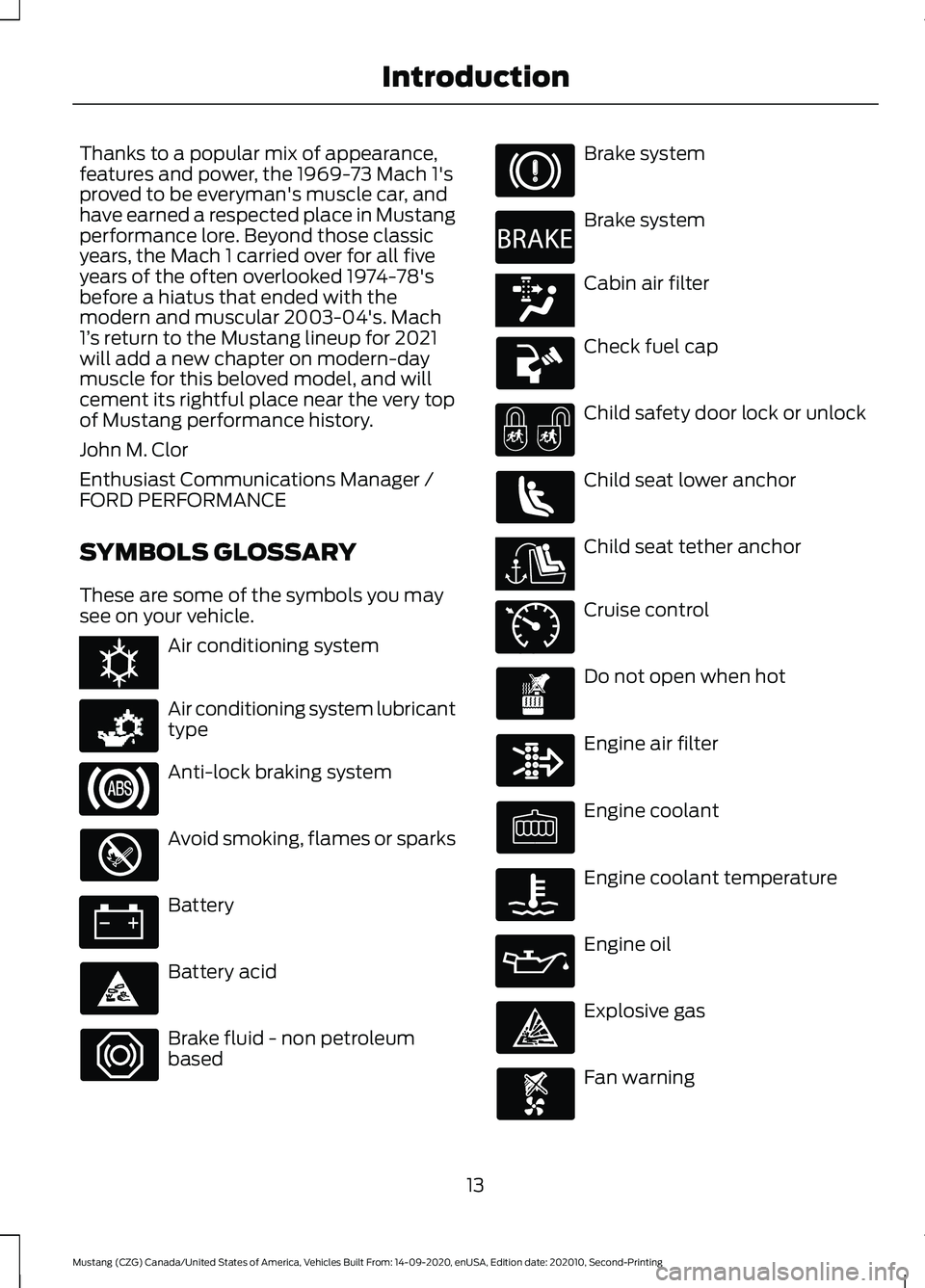
Thanks to a popular mix of appearance,
features and power, the 1969-73 Mach 1's
proved to be everyman's muscle car, and
have earned a respected place in Mustang
performance lore. Beyond those classic
years, the Mach 1 carried over for all five
years of the often overlooked 1974-78's
before a hiatus that ended with the
modern and muscular 2003-04's. Mach
1’
s return to the Mustang lineup for 2021
will add a new chapter on modern-day
muscle for this beloved model, and will
cement its rightful place near the very top
of Mustang performance history.
John M. Clor
Enthusiast Communications Manager /
FORD PERFORMANCE
SYMBOLS GLOSSARY
These are some of the symbols you may
see on your vehicle. Air conditioning system
Air conditioning system lubricant
type
Anti-lock braking system
Avoid smoking, flames or sparks
Battery
Battery acid
Brake fluid - non petroleum
based Brake system
Brake system
Cabin air filter
Check fuel cap
Child safety door lock or unlock
Child seat lower anchor
Child seat tether anchor
Cruise control
Do not open when hot
Engine air filter
Engine coolant
Engine coolant temperature
Engine oil
Explosive gas
Fan warning
13
Mustang (CZG) Canada/United States of America, Vehicles Built From: 14-09-2020, enUSA, Edition date: 202010, Second-Printing IntroductionE162384 E231157 E270480 E139223 E141128 E71340
Page 94 of 530
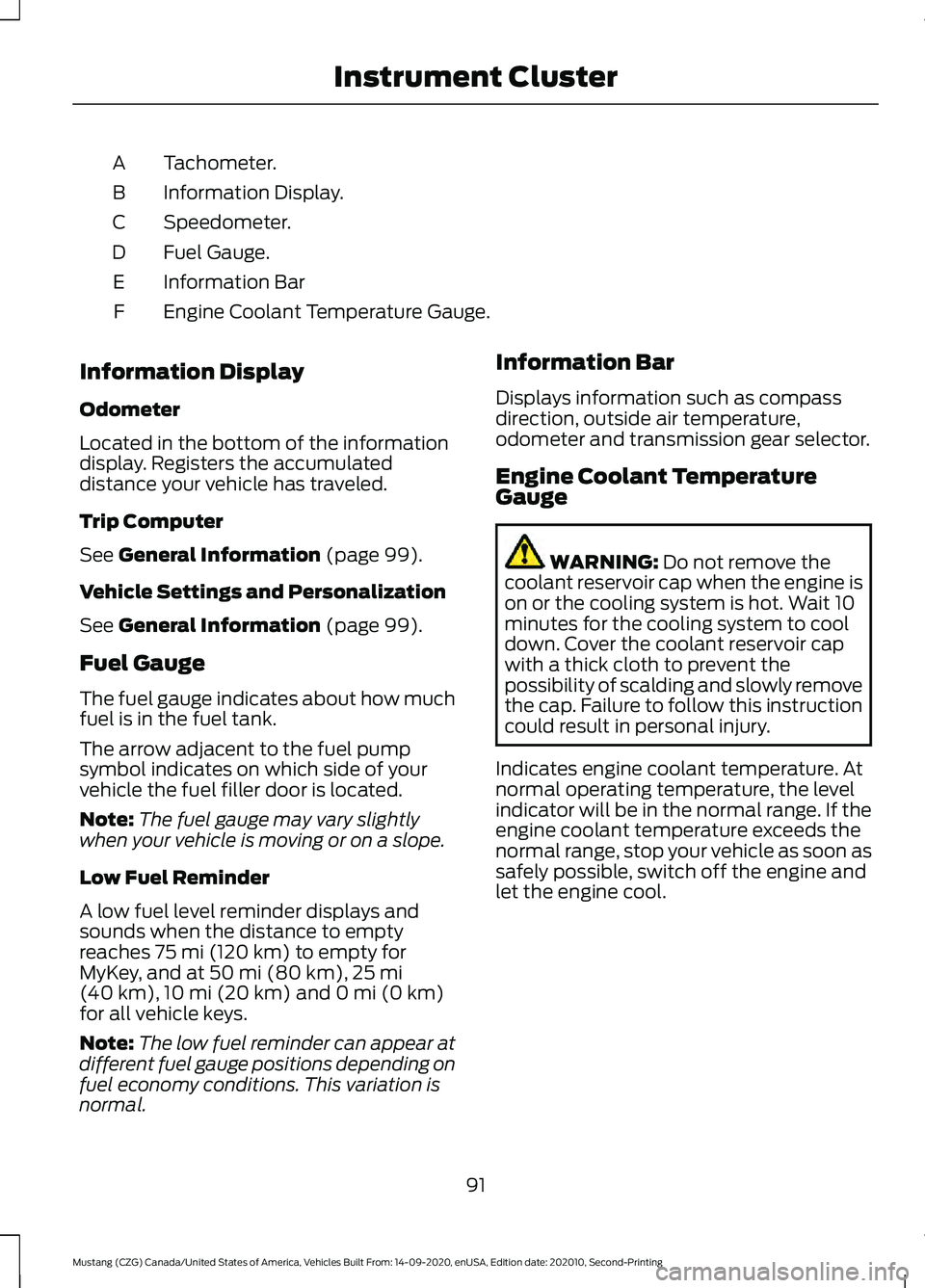
Tachometer.
A
Information Display.
B
Speedometer.
C
Fuel Gauge.
D
Information Bar
E
Engine Coolant Temperature Gauge.
F
Information Display
Odometer
Located in the bottom of the information
display. Registers the accumulated
distance your vehicle has traveled.
Trip Computer
See General Information (page 99).
Vehicle Settings and Personalization
See
General Information (page 99).
Fuel Gauge
The fuel gauge indicates about how much
fuel is in the fuel tank.
The arrow adjacent to the fuel pump
symbol indicates on which side of your
vehicle the fuel filler door is located.
Note: The fuel gauge may vary slightly
when your vehicle is moving or on a slope.
Low Fuel Reminder
A low fuel level reminder displays and
sounds when the distance to empty
reaches
75 mi (120 km) to empty for
MyKey, and at 50 mi (80 km), 25 mi
(40 km), 10 mi (20 km) and 0 mi (0 km)
for all vehicle keys.
Note: The low fuel reminder can appear at
different fuel gauge positions depending on
fuel economy conditions. This variation is
normal. Information Bar
Displays information such as compass
direction, outside air temperature,
odometer and transmission gear selector.
Engine Coolant Temperature
Gauge
WARNING:
Do not remove the
coolant reservoir cap when the engine is
on or the cooling system is hot. Wait 10
minutes for the cooling system to cool
down. Cover the coolant reservoir cap
with a thick cloth to prevent the
possibility of scalding and slowly remove
the cap. Failure to follow this instruction
could result in personal injury.
Indicates engine coolant temperature. At
normal operating temperature, the level
indicator will be in the normal range. If the
engine coolant temperature exceeds the
normal range, stop your vehicle as soon as
safely possible, switch off the engine and
let the engine cool.
91
Mustang (CZG) Canada/United States of America, Vehicles Built From: 14-09-2020, enUSA, Edition date: 202010, Second-Printing Instrument Cluster
Page 96 of 530
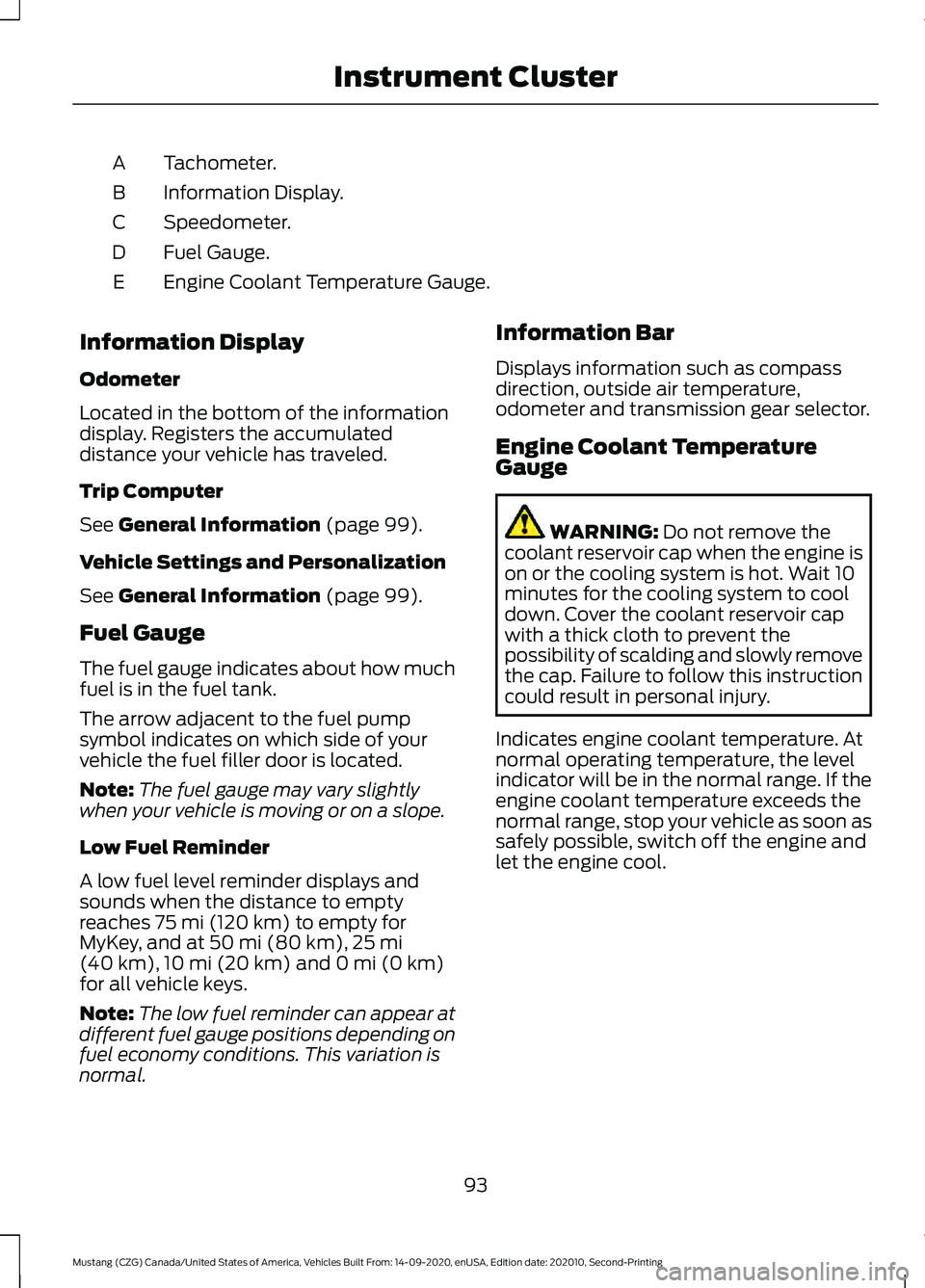
Tachometer.
A
Information Display.
B
Speedometer.
C
Fuel Gauge.
D
Engine Coolant Temperature Gauge.
E
Information Display
Odometer
Located in the bottom of the information
display. Registers the accumulated
distance your vehicle has traveled.
Trip Computer
See General Information (page 99).
Vehicle Settings and Personalization
See
General Information (page 99).
Fuel Gauge
The fuel gauge indicates about how much
fuel is in the fuel tank.
The arrow adjacent to the fuel pump
symbol indicates on which side of your
vehicle the fuel filler door is located.
Note: The fuel gauge may vary slightly
when your vehicle is moving or on a slope.
Low Fuel Reminder
A low fuel level reminder displays and
sounds when the distance to empty
reaches
75 mi (120 km) to empty for
MyKey, and at 50 mi (80 km), 25 mi
(40 km), 10 mi (20 km) and 0 mi (0 km)
for all vehicle keys.
Note: The low fuel reminder can appear at
different fuel gauge positions depending on
fuel economy conditions. This variation is
normal. Information Bar
Displays information such as compass
direction, outside air temperature,
odometer and transmission gear selector.
Engine Coolant Temperature
Gauge
WARNING:
Do not remove the
coolant reservoir cap when the engine is
on or the cooling system is hot. Wait 10
minutes for the cooling system to cool
down. Cover the coolant reservoir cap
with a thick cloth to prevent the
possibility of scalding and slowly remove
the cap. Failure to follow this instruction
could result in personal injury.
Indicates engine coolant temperature. At
normal operating temperature, the level
indicator will be in the normal range. If the
engine coolant temperature exceeds the
normal range, stop your vehicle as soon as
safely possible, switch off the engine and
let the engine cool.
93
Mustang (CZG) Canada/United States of America, Vehicles Built From: 14-09-2020, enUSA, Edition date: 202010, Second-Printing Instrument Cluster
Page 98 of 530

Blind Spot Information System
Indicator (If Equipped)
It illuminates when you switch
the system off.
See
Blind Spot Information
System (page 196).
Brake System Warning Lamp WARNING:
Driving your vehicle
with the warning lamp on is dangerous.
A significant decrease in braking
performance may occur. It may take you
longer to stop your vehicle. Have your
vehicle checked as soon as possible.
Driving extended distances with the
parking brake engaged can cause brake
failure and the risk of personal injury.
Note: Indicators vary depending on region.
This lamp is a dual function lamp and will
illuminate when:
• You apply the parking brake with the
ignition on.
• Your vehicle has a brake fault or low
brake fluid level, regardless of parking
brake position. If the lamp illuminates when you
are moving, you may have the
parking brake applied. Make sure
the parking brake is off. Have
your vehicle checked as soon as
possible if the lamp continues to
illuminate.
Cruise Control Indicator It illuminates when you switch
the system on.
See
Switching Cruise Control
On and Off (page 184). Direction Indicator It illuminates when the left or
right direction indicator or the
hazard warning flasher is turned
on. Flashes during operation. An increase
in the rate of flashing warns of a failed
indicator bulb.
Door Ajar Warning Lamp Displays when the ignition is on
and any door is not completely
closed.
Engine Coolant Temperature
Warning Lamp If it illuminates when your vehicle
is moving, this indicates that the
engine is overheating. Stop your
vehicle as soon as it is safe to do so and
switch the engine off. Have your vehicle
checked as soon as possible.
Fasten Seatbelt Warning Lamp It illuminates and a chime
sounds until you fasten the
seatbelts.
Front Fog Lamp Indicator (If Equipped) It illuminates when you switch
the front fog lamps on.
Heads Up Display
(If Equipped) A red beam of lights will
illuminate on the windshield in
certain instances when using
adaptive cruise control or the collision
warning system. It will also illuminate
momentarily when you start your vehicle
to make sure the display works.
95
Mustang (CZG) Canada/United States of America, Vehicles Built From: 14-09-2020, enUSA, Edition date: 202010, Second-Printing Instrument ClusterE151262 E270480 E71340 E71880 E156133
Page 154 of 530
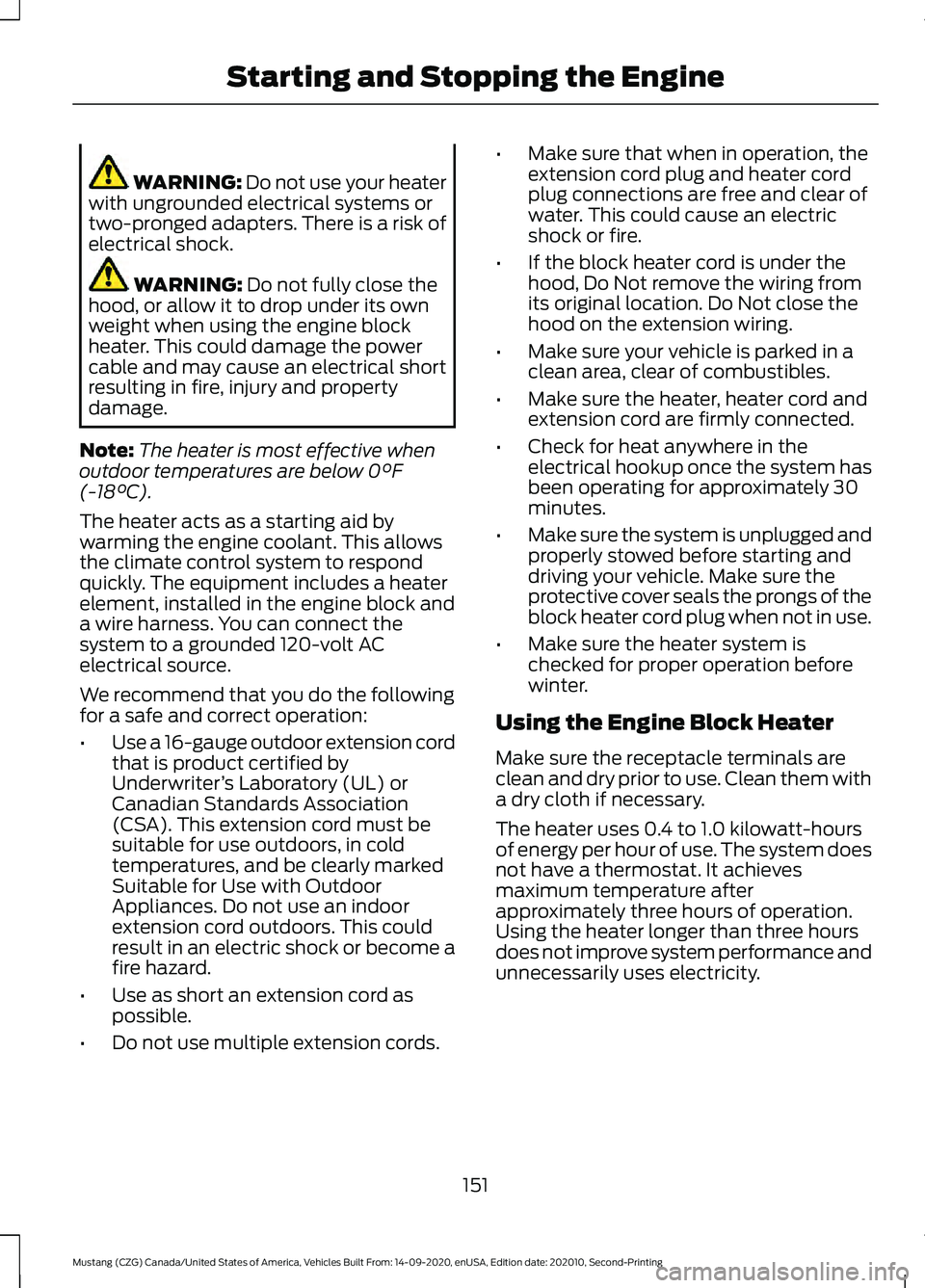
WARNING: Do not use your heater
with ungrounded electrical systems or
two-pronged adapters. There is a risk of
electrical shock. WARNING: Do not fully close the
hood, or allow it to drop under its own
weight when using the engine block
heater. This could damage the power
cable and may cause an electrical short
resulting in fire, injury and property
damage.
Note: The heater is most effective when
outdoor temperatures are below
0°F
(-18°C).
The heater acts as a starting aid by
warming the engine coolant. This allows
the climate control system to respond
quickly. The equipment includes a heater
element, installed in the engine block and
a wire harness. You can connect the
system to a grounded 120-volt AC
electrical source.
We recommend that you do the following
for a safe and correct operation:
• Use a 16-gauge outdoor extension cord
that is product certified by
Underwriter ’s Laboratory (UL) or
Canadian Standards Association
(CSA). This extension cord must be
suitable for use outdoors, in cold
temperatures, and be clearly marked
Suitable for Use with Outdoor
Appliances. Do not use an indoor
extension cord outdoors. This could
result in an electric shock or become a
fire hazard.
• Use as short an extension cord as
possible.
• Do not use multiple extension cords. •
Make sure that when in operation, the
extension cord plug and heater cord
plug connections are free and clear of
water. This could cause an electric
shock or fire.
• If the block heater cord is under the
hood, Do Not remove the wiring from
its original location. Do Not close the
hood on the extension wiring.
• Make sure your vehicle is parked in a
clean area, clear of combustibles.
• Make sure the heater, heater cord and
extension cord are firmly connected.
• Check for heat anywhere in the
electrical hookup once the system has
been operating for approximately 30
minutes.
• Make sure the system is unplugged and
properly stowed before starting and
driving your vehicle. Make sure the
protective cover seals the prongs of the
block heater cord plug when not in use.
• Make sure the heater system is
checked for proper operation before
winter.
Using the Engine Block Heater
Make sure the receptacle terminals are
clean and dry prior to use. Clean them with
a dry cloth if necessary.
The heater uses 0.4 to 1.0 kilowatt-hours
of energy per hour of use. The system does
not have a thermostat. It achieves
maximum temperature after
approximately three hours of operation.
Using the heater longer than three hours
does not improve system performance and
unnecessarily uses electricity.
151
Mustang (CZG) Canada/United States of America, Vehicles Built From: 14-09-2020, enUSA, Edition date: 202010, Second-Printing Starting and Stopping the Engine
Page 232 of 530
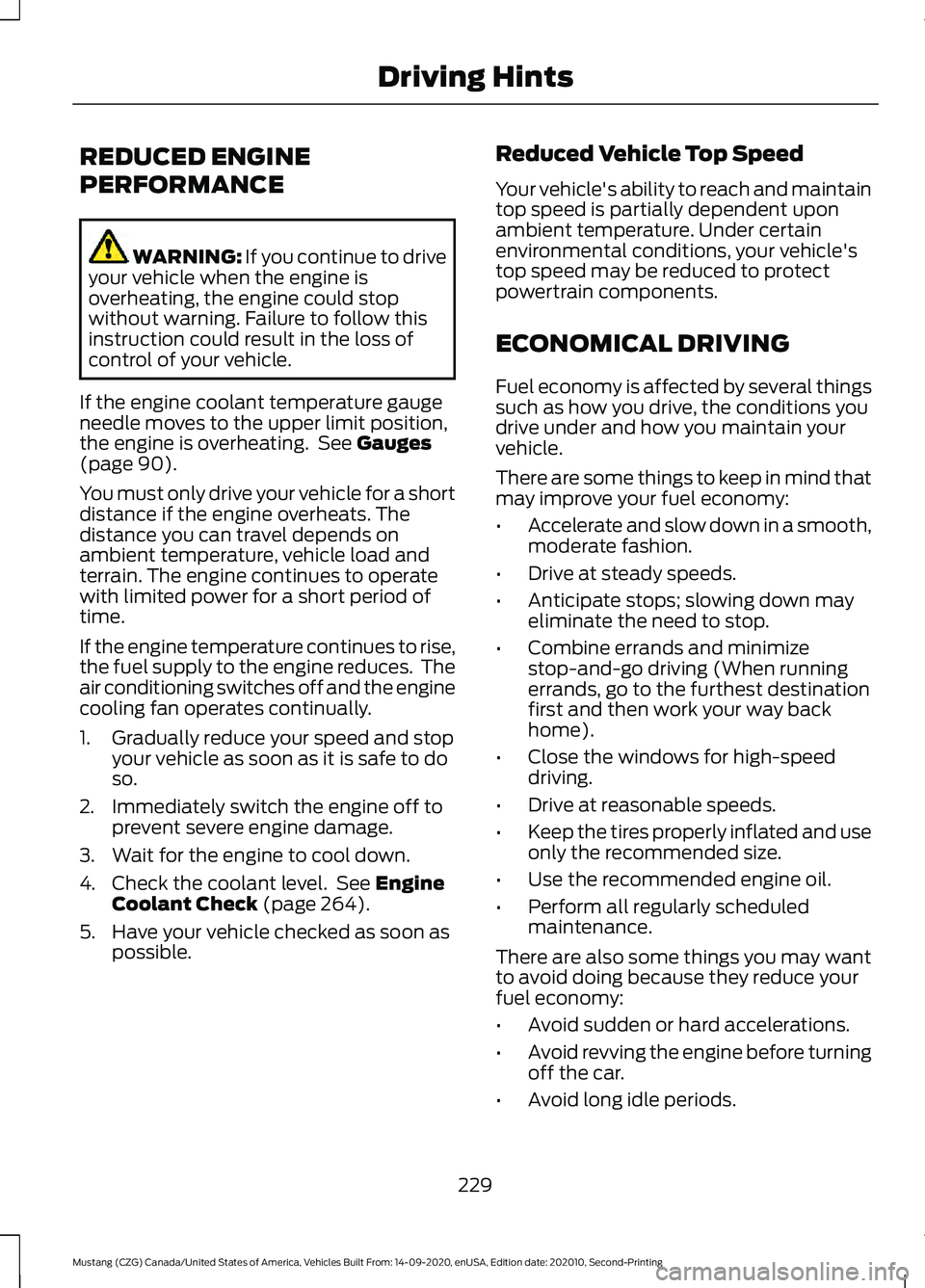
REDUCED ENGINE
PERFORMANCE
WARNING: If you continue to drive
your vehicle when the engine is
overheating, the engine could stop
without warning. Failure to follow this
instruction could result in the loss of
control of your vehicle.
If the engine coolant temperature gauge
needle moves to the upper limit position,
the engine is overheating. See Gauges
(page 90).
You must only drive your vehicle for a short
distance if the engine overheats. The
distance you can travel depends on
ambient temperature, vehicle load and
terrain. The engine continues to operate
with limited power for a short period of
time.
If the engine temperature continues to rise,
the fuel supply to the engine reduces. The
air conditioning switches off and the engine
cooling fan operates continually.
1. Gradually reduce your speed and stop your vehicle as soon as it is safe to do
so.
2. Immediately switch the engine off to prevent severe engine damage.
3. Wait for the engine to cool down.
4. Check the coolant level. See
Engine
Coolant Check (page 264).
5. Have your vehicle checked as soon as possible. Reduced Vehicle Top Speed
Your vehicle's ability to reach and maintain
top speed is partially dependent upon
ambient temperature. Under certain
environmental conditions, your vehicle's
top speed may be reduced to protect
powertrain components.
ECONOMICAL DRIVING
Fuel economy is affected by several things
such as how you drive, the conditions you
drive under and how you maintain your
vehicle.
There are some things to keep in mind that
may improve your fuel economy:
•
Accelerate and slow down in a smooth,
moderate fashion.
• Drive at steady speeds.
• Anticipate stops; slowing down may
eliminate the need to stop.
• Combine errands and minimize
stop-and-go driving (When running
errands, go to the furthest destination
first and then work your way back
home).
• Close the windows for high-speed
driving.
• Drive at reasonable speeds.
• Keep the tires properly inflated and use
only the recommended size.
• Use the recommended engine oil.
• Perform all regularly scheduled
maintenance.
There are also some things you may want
to avoid doing because they reduce your
fuel economy:
• Avoid sudden or hard accelerations.
• Avoid revving the engine before turning
off the car.
• Avoid long idle periods.
229
Mustang (CZG) Canada/United States of America, Vehicles Built From: 14-09-2020, enUSA, Edition date: 202010, Second-Printing Driving Hints
Page 261 of 530

UNDER HOOD OVERVIEW - 2.3L ECOBOOST™
Battery (out of view). See Changing the 12V Battery (page 270).
A
Engine oil dipstick. See
Engine Oil Dipstick (page 261).
B
Engine oil filler cap. See
Engine Oil Check (page 261).
C
Brake fluid reservoir. See
Brake Fluid Check (page 269).
D
Air filter assembly. See
Changing the Engine Air Filter (page 262).
E
Engine coolant reservoir. See
Engine Coolant Check (page 264).
F
Windshield washer fluid reservoir. See
Washer Fluid Check (page 274).
G
Power distribution box. See
Fuses (page 245).
H
Note: Your vehicle may not have an engine
cover as shown.
258
Mustang (CZG) Canada/United States of America, Vehicles Built From: 14-09-2020, enUSA, Edition date: 202010, Second-Printing MaintenanceE174450